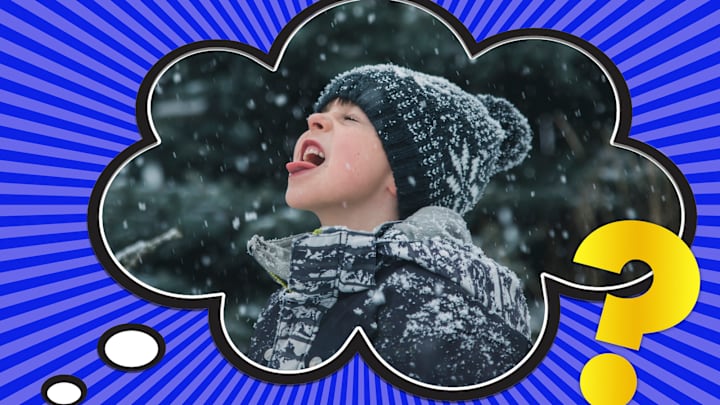From little flurries to full-scale blizzards, it’s not unusual for snow to fall come winter. During the cold weather months, some folks like to share recipes for how to make snow ice cream and other treats that use fresh powder as a base, adding milk, sugar, and toppings.
Obviously, no one is recommending anyone scoop up a bowlful of snow idling on the side of the road, full of salt, muck, and other unpleasantness. But it does beg the question: Is any snow actually safe to consume?
While you may assume snow that’s freshly fallen and collected in an undisturbed area—even a cup set out for that purpose—is free of any contaminants, don’t be so sure. According to meteorologist Mary Scarzello Fairbanks, who spoke with Prevention in 2021, snow isn’t all that pristine. It’s formed when water droplets freeze around some dust or debris in the air, forming an ice crystal that continues to collect water vapor and form a snowflake.
When it falls, it will also collect things hanging in the air, including dirt, soot, and even bacterial particles. Depending on the region, snow could also contain sulfates, nitrates, formaldehyde, mercury, or pesticides. If it’s windy, snow could even mix with dirt kicked up from the soil before settling. A 2015 study published in the journal Environmental Science: Processes & Impacts even demonstrated how snow could mix with gasoline exhaust. This all means that, theoretically, your snow ice cream could have some pretty disgusting “toppings.”
At the same time, there doesn’t seem to be a surge of reports of illnesses related to snow consumption, and the contaminants it may cling to in the air are also present as we breathe. Assuming you don’t consume a huge quantity of it, it’s unlikely that whatever contaminants might be in the snow will be present in large enough amounts to cause problems. While no one is technically advocating for snow ingestion here, just a small bite will probably be fine.
Eating snow in an emergency is another matter. The Centers for Disease Control and Prevention (CDC) warns against snow snacking for anyone stranded, such as hikers, because it can lower one’s body temperature. In cases where there is a water supply issue, the CDC says it’s safe to take collected snow and boil it to kill off any germs.
Have you got a Big Question you'd like us to answer? If so, let us know by emailing us at bigquestions@mentalfloss.com.
A version of this article was originally published in 2021; it has been updated for 2024.
